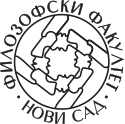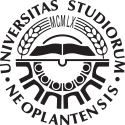15FLFL026 - Philosophical Anthropology
| Course specification | ||||
|---|---|---|---|---|
| Course title | Philosophical Anthropology | |||
| Acronym | 15FLFL026 | |||
| Study programme | Philosophy | |||
| Module | ||||
| Type of study | first degree undergraduate academic studies | |||
| Lecturer (for classes) | ||||
| Lecturer/Associate (for practice) | ||||
| Lecturer/Associate (for OTC) | ||||
| ESPB | 6.0 | Status | ||
| Condition | No prerequisite. | Oblik uslovljenosti | ||
| The goal | Introducing students with basic ideas of understanding of man in the history of philosophy. The overview of the historical conditions that led to constitution of Philosophical anthropology as an autonomous philosophical discipline. The objective of the course is in introducing students to specific differences between Philosophical anthropology in comparison to similar disciplines in the realm of natural sciences. Introduction to the possible directions of interdisciplinary research in the field of Philosophical anthropology. | |||
| The outcome | The course „Philosophical anthropology“ aims to facilitate students' acquisition of comprehensive knowledge with regard to the specifics of understanding of man in certain historical periods. Orientation in terms of identifying key ideas and basic points of view of man in philosophy. Students should be able to articulate differences between specific approaches of researching man. Practical application of the knowledge regarding anthropological problems we face in the contemporary world. | |||
| Contents | ||||
| Contents of lectures | Antique notion of man. Hellenistic conceptions of man. Understanding of man in Christianity. Renaissance and"restoration". Thematization of man in the Enlightenment. Romantic criticism of the enlightened man. Understanding of man in the philosophy of German idealism. The constitution of Philosophical anthropology as an autonomous discipline. Basic phenomena of human existence. Human institutions from the perspectives of Philosophical anthropology. Possibilities of interdisciplinary work between philosophy and natural sciences considering the most relevant problems in the area of Philosophical anthropology. | |||
| Contents of exercises | Projection of films and other materials. Consideration of contemporary art and media regarding the problems of philosophical anthropology in order to examine possibility of its application and furthered grasping of contemporary man. | |||
| Literature | ||||
| ||||
| Number of hours per week during the semester/trimester/year | ||||
| Lectures | Exercises | OTC | Study and Research | Other classes |
| 2 | 1 | |||
| Methods of teaching | Lectures.Projection of films and other visual and audiomaterials Discussion on given topics. Practical demonstration of textual analysis.Individual research. | |||
| Knowledge score (maximum points 100) | ||||
| Pre obligations | Points | Final exam | Points | |
| Activites during lectures | 30 | Test paper | ||
| Practical lessons | 20 | Oral examination | 50 | |
| Projects | ||||
| Colloquia | ||||
| Seminars | ||||

